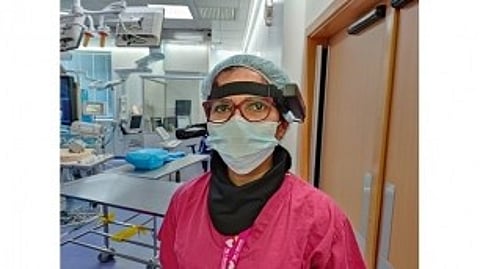
- Home
- NewsGram USA
- India
- न्यूजग्राम
- World
- Politics
- Entertainment
- Culture
- Lifestyle
- Economy
- Sports
- Sp. Coverage
- Misc.
- NewsGram Exclusive
- Jobs / Internships

The smart glasses enable heart staff at the Essex Cardiothoracic Centre (CTC) at Basildon Hospital to receive real-time advice from anywhere in the world
IANS
In a revolutionary procedure, health workers at a hospital in the UK are using smart glasses to help speed up the time for heart surgery.
The glasses enable heart staff at the Essex Cardiothoracic Centre (CTC) at Basildon Hospital to receive real-time advice from anywhere in the world as they share a live feed from the operating theatre through a high-resolution camera on the smart glasses.
Known as transcatheter aortic valve implantation (TAVI), the procedure involves inserting a new valve via a blood vessel in the leg, that is then guided towards the beating heart by the cardiologist where they can then replace the diseased valve.
Using the smart glasses, the staff can be remotely guided by an expert from anywhere in the world, helping save time for patients and staff.
"This new innovative equipment allows us to be more independent and to carry out more procedures, and means we can treat patients more quickly as we don't need a specialist to come to the hospital," said Dr Rohan Jagathesan, Medical Director at the Essex CTC, in a statement.
"We can also use the smart glasses to train our staff during a simulated procedure and further develop their skills, helping to improve the service we give to our patients," he added.
According to cardiologist Dr Christopher Cook, the glasses also allow experts to supervise multiple procedures simultaneously in different locations.
"We can have complete independence in listing as many patients as possible," he was quoted as saying to the BBC.
"What we've done is thought about innovative technological solutions to allow us to do this without a human being present in our hospital," he said. (NS/IANS)
